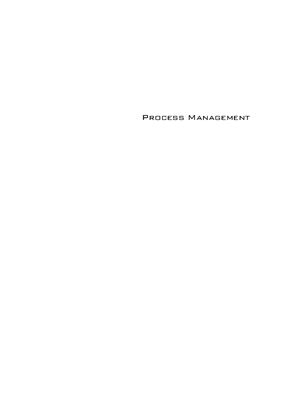Издательство InTech, 2010, -352 pp.
Process management is presented as knowledge, skills, tools, techniques and systems to define, visualize, measure, control, report and improve processes with the goal to meet people requirements profitably. We can it apply first and foremost by doing business as well as by management processes in many separate areas of our life. To be successful in this process it is needed continually provide the effectiveness of the results of all processes and their constant optimization. It is necessary to monitor the business performance of all pertinent business processes all the time, detect and report weaknesses and problem situations, ideally even suggest optimization option and evaluate the success of improvement measures. Substantive recommendations for actions, including their chances of success, are needed so that the better decisions can be made more quickly. This book reports about the process management research and development findings and results in many various areas.
The content of the book has been structured into four technical research sections with total of 18 chapters written by well recognized researchers worldwide. These sections are:
process and performance management and their measurement methods,
management of manufacturing processes with the aim to be quickly adaptable after real situation demands and their control,
quality management information and communication systems, their integration and risk management,
management processes of healthcare and water, construction and demolition waste problems and integration of environmental processes into management decisions.
Process Management
Process Performance Measurement as Part of Business Process Management in Manufacturing Area
A Design for Quality Management Information System in Short Delivery Time Processes
Design Cycle Period Management
Supervisory Control of Industrial Processes
An Approach to Technological Processes Automation using Technological Coalitions Based on Discrete Event Models
Semi-Empirical Modelling and Management of Flotation Deinking Banks by Process Simulation
Meeting Organizational Performance with Shared Knowledge Management Processes
Optimizing of Enterprise Communication Processes Management
Virtual Work Group Collaboration in a Manufacturing
Integration of BPM Systems
The Reputation Crisis: Risk Management based Logical Framework to the Corporate Sustainability
Planning Approaches to the Management of Water Problems in Mexico
Utilizing Wastewater Reuse and Desalination Processes to Reduce the Environmental Impacts of Agriculture
Integration of Environmental Processes into Land-use Management Decisions
Guidelines to Improve Construction and Demolition Waste Management in Portugal
Establishment a Resource Management Program for Accreditation Process at the Medical Laboratory
Understanding Discrepancy: A Conceptual Persistent Healthcare Quality Improvement Process for Software Development Management
Process management is presented as knowledge, skills, tools, techniques and systems to define, visualize, measure, control, report and improve processes with the goal to meet people requirements profitably. We can it apply first and foremost by doing business as well as by management processes in many separate areas of our life. To be successful in this process it is needed continually provide the effectiveness of the results of all processes and their constant optimization. It is necessary to monitor the business performance of all pertinent business processes all the time, detect and report weaknesses and problem situations, ideally even suggest optimization option and evaluate the success of improvement measures. Substantive recommendations for actions, including their chances of success, are needed so that the better decisions can be made more quickly. This book reports about the process management research and development findings and results in many various areas.
The content of the book has been structured into four technical research sections with total of 18 chapters written by well recognized researchers worldwide. These sections are:
process and performance management and their measurement methods,
management of manufacturing processes with the aim to be quickly adaptable after real situation demands and their control,
quality management information and communication systems, their integration and risk management,
management processes of healthcare and water, construction and demolition waste problems and integration of environmental processes into management decisions.
Process Management
Process Performance Measurement as Part of Business Process Management in Manufacturing Area
A Design for Quality Management Information System in Short Delivery Time Processes
Design Cycle Period Management
Supervisory Control of Industrial Processes
An Approach to Technological Processes Automation using Technological Coalitions Based on Discrete Event Models
Semi-Empirical Modelling and Management of Flotation Deinking Banks by Process Simulation
Meeting Organizational Performance with Shared Knowledge Management Processes
Optimizing of Enterprise Communication Processes Management
Virtual Work Group Collaboration in a Manufacturing
Integration of BPM Systems
The Reputation Crisis: Risk Management based Logical Framework to the Corporate Sustainability
Planning Approaches to the Management of Water Problems in Mexico
Utilizing Wastewater Reuse and Desalination Processes to Reduce the Environmental Impacts of Agriculture
Integration of Environmental Processes into Land-use Management Decisions
Guidelines to Improve Construction and Demolition Waste Management in Portugal
Establishment a Resource Management Program for Accreditation Process at the Medical Laboratory
Understanding Discrepancy: A Conceptual Persistent Healthcare Quality Improvement Process for Software Development Management

